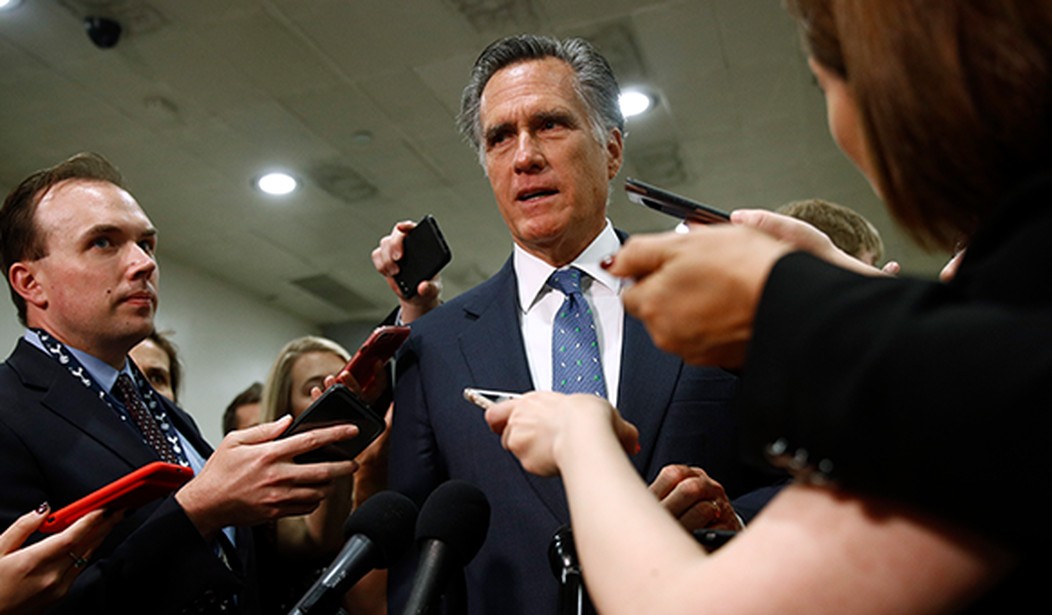If the bipartisan “infrastructure” bill passes, Senate Republicans who vote for it will have some explaining to do on two provisions buried in the text. One will make it too expensive to drive, and the other will eliminate local control of zoning. Both are extensions of Obama-era policy intended to destroy the suburbs by depriving them of funding to repair roads if they don’t let the federal government mandate zoning and make commuting from them outrageously expensive.
The first unacceptable provision the Republican negotiators agreed to can be found beginning on page 510 of the text. It directs the secretary of Transportation and the secretary of the Treasury to begin a pilot program for a national motor vehicle per-mile user fee. The fee is a revenue mechanism that charges people operating motor vehicles on the surface transportation system based on the number of miles traveled.
Related: Atlanta’s ‘Marxist Land Grab’ Is a Preview of Joe Biden’s Nefarious Plans for the Suburbs
The pilot’s objective is to provide recommendations for the adoption and implementation of a national per-mile fee for all drivers. Some Republicans support a fee structure that will impact middle- and working-class families who are less likely to purchase hybrid vehicles and often live away from work because of lower housing prices or better quality of life. It won’t be a picnic for upper-middle-class families either.
According to the Congressional Research Service, this policy is an alternative to the per-gallon fuel tax. However, anyone who has been alive for longer than a few decades knows taxes do not get eliminated. The analysis also notes that both an increase in the fuel tax and a per-mile fee will face opposition.
The per-mile fee would also come with privacy concerns if an electronic method is used to calculate it. The options provided in the legislation are third party on-board diagnostics like a Fast Pass, smartphone applications, telemetric data installed by automakers, data collected by auto insurers, and data from states that received a grant from Section 6020 of the Fixing America’s Surface Transportation Act (FAST Act) of 2015. The collection of more personal and location data is not popular with people on the political right. Yet Republicans who long to “get things done” and still believe Democrats act in good faith will sign you right up for it.
Related: Trump Was Right: The Biden Administration Is Intent on Destroying the Suburbs
If your state has implemented highway segments where the cost fluctuates based on the amount of traffic that utilizes Fast Pass technology, it is a fair bet it took a grant. It is not entirely clear this means the federal government can compel those states to turn over user data, but this is likely. On page 512, it also states that the pilot will use “volunteer” participants among personal and commercial vehicles in states that took grants. It is possible you “volunteer” if your state took a grant.
The real purpose of the pilot is to figure out how to administer the program. The federal government did a dry run by funding programs under Section 6020 of the FAST Act and gaining an understanding of how to charge users per mile and based on traffic congestion. If the final bill includes this provision, a per-mile user fee is all but assured. Squishy Republicans are signing on to limit Americans’ freedom of movement, choice of where to live in relation to work, and possibly their ability to own and maintain a vehicle.
In a separate provision, Politico notes:
An overarching trend of the legislation is concentrating transportation policy decision-making in the federal government. “If this BIF deal holds, it would put just a staggering amount of money in the hands of [Transportation Secretary Pete Buttigieg] to distribute via [DOT’s] own selection of projects (competitive grants) instead of the traditional formula-based distribution to states and cities. Just staggering,” noted Jeff Davis of the Eno Center for Transportation.
This concentration of power under Buttigieg is intentional. It is a backdoor way for the administration to implement the Booker amendment to the AFFH. To get communities to comply with provisions of that regulation, such as eliminating single-family zoning, Senator Cory Booker (D-N.J.) proposed withholding Department of Transportation funds if they refused.
Related: Republicans Fall for Biden’s Infrastructure ‘Bait and Switch’
Now that power will lie solely in the hands of Buttigieg. Communities that reject a federal takeover of local zoning will lose funds in a “competitive” process. Before the election, President Biden agreed to revive the AFFH and add the Booker amendment. The “infrastructure” bill operationalizes it without a vote on an explicit measure in Congress. So-called Republicans are okay with you losing local control of your community.
Unless the amendment process removes these two provisions, Republicans cannot vote to pass this bill. It is bad enough that the bipartisan label gives Democrats cover on their much more ambitious spending plans by claiming some portion had Republican support. The details punish working Americans and entire communities by giving the federal government excessive control over local decisions and a new variable tax. Any Republican senator who votes for this must pay the next time they are on the ballot.










Join the conversation as a VIP Member